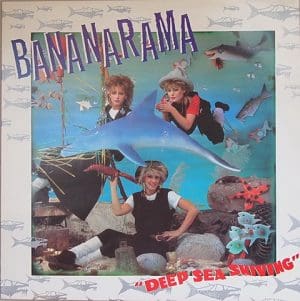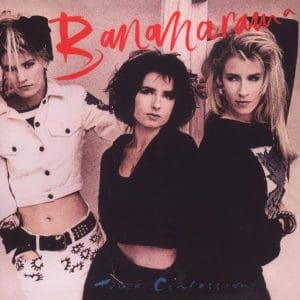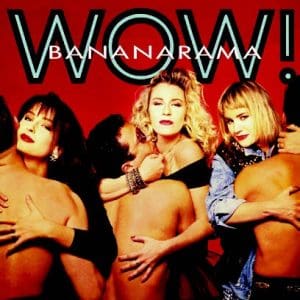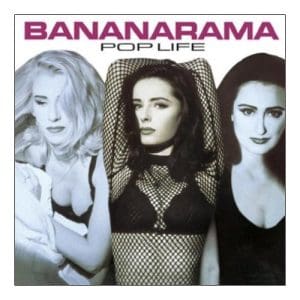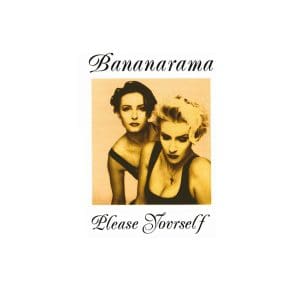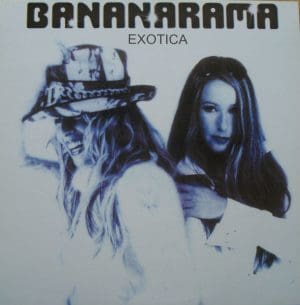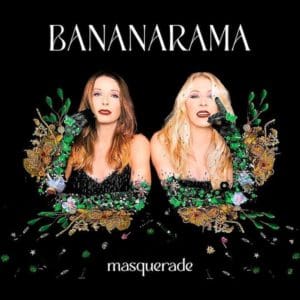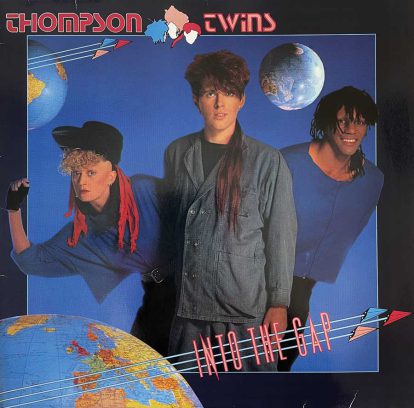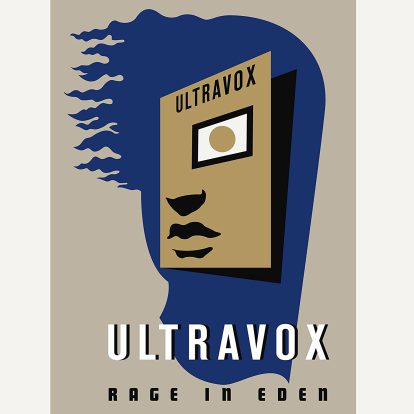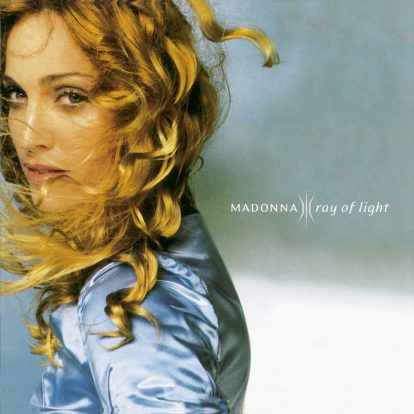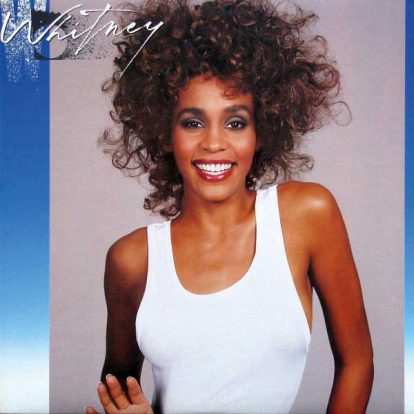The albums of Bananarama have spanned from post-punk to shiny pop…
Deep Sea Skiving, 1983
As introductions go, few made an impression as indelible as Bananarama’s March 1983 debut album, Deep Sea Skiving. Falling somewhere between The Slits and The Supremes, these ramshackle Ronettes blended the notion of the classic girl groups of the 60s and the DIY ethos of the punk scene that spawned them to carve out a niche entirely of their own.
Having started the group a few years previously, childhood friends Sara Dallin and Keren Woodward, along with Siobhan Fahey, had navigated the London club scene, developed a knack for social networking and landed gigs with former Sex Pistols and Professionals drummer Paul Cook – he co-produced their debut single, a cover of Black Blood’s Aie A Mwana – and The Specials’ Terry Hall (he invited them to sing on his next single with Fun Boy Three, It Ain’t What You Do It’s The Way That You Do It).
They went on to win John Peel’s seal of approval, graced the pages of The Face and performed with Fun Boy Three on Top Of The Pops, before landing a deal with London Records and heading into the studio to begin work on their debut LP with producer Barry Blue.
Huge fans of Imagination’s Body Talk, the girls also tracked down its producers, Steve Jolley and Tony Swain, who helped them score two more Top 5 hits with the glorious Shy Boy, a new wave twist on the girl group sound complete with shoop-shoop background vocals, and a cover of Na Na Hey Hey Kiss Him Goodbye.
Elsewhere, they reunited with Fun Boy Three for a cover of The Velvettes’ on Really Saying Something, What A Shambles is a biting commentary on scoring chart hits while still signing on the dole and having to go to the laundrette, Hey Young London lambasts the pretentious preening peacocks of the Blitz club and Cheers Then is a heart-warming ode to friendship.
A pair of tracks later made it big for other artists – the Paul Weller-penned Doctor Love (which was a hit for Tracie in 1984) and Young At Heart – written by the girls with The Bluebells’ Robert Hodgens, who scored with it with his band a year later, though their country-fied take was vastly different to the Bananarama version.
Reaching No.7 in the UK – Bananarama’s highest-charting studio album, Deep Sea Skiving is packed with attitude, killer hooks and a charming amateurish quality that makes for an inviting debut.
Bananarama, 1984
Although they had notched up four Top 5 singles by the time they began work on their second album, Sara, Keren and Siobhan still felt they had to prove themselves as songwriters given that those hits comprised three covers and a Swain & Jolley composition while the self-penned Cheers Then had missed the Top 40, disappointing them greatly.
Despite their chart record, the girls also felt they weren’t held in the same regard as their male peers, who had achieved similar, or in some cases, less success than they had. It was decided they would write the entire second album with Swain & Jolley (only one cover, their take on the obscure Six Sed Red’s Dream Baby, made the record).
Aware that they were perceived as fluffy and throwaway – though much of this was admittedly down to their own charmingly shambolic attempts at choreography and a habit of giggling through interviews – the girls set about changing the public’s perception on their second LP by writing about social issues.
Fusing infectious pop melodies with lyrics tackling subjects such as street gangs (King Of The Jungle), drug addiction (Hot Line To Heaven) and poverty (Rough Justice) gives Bananarama a darker edge than its predecessor but the poor chart performances of Rough Justice and Hot Line To Heaven as singles provoked questions as to what the public wanted from the group. Tracks such as State I’m In, which again harks back to classic 60s girl groups, may have fared better.
The exception was Robert De Niro’s Waiting, a song written about PTSD and idolising a celebrity to mask personal trauma, which possessed an undeniable hook. That infectious melody plus the novelty of featuring an actor’s name in the title provided the girls’ biggest UK success to date, reaching No.3 in the UK.
The tropical-sounding melancholia of Cruel Summer, now recognised as a classic, was the album’s other big hit and gave them international success, reaching the Top 10 in the United States, thanks mainly to its use in The Karate Kid movie. The US edition of the album also included The Wild Life, recorded shortly after Bananarama’s release for a film soundtrack and one of their finest songs.
True Confessions, 1986
The band’s third album reflects a transitional time in their history, serving as a bridge between their early rough and ready sound and the polished pop of their union with Stock Aitken Waterman. Though its biggest hit, Venus, doesn’t really represent the remainder of the LP, True Confessions is nevertheless a strong album packed with well-crafted pop.
The fantastic title track bounces with energy and is armed with a killer chorus, Ready Or Not is painted from the same sonic palette as Alison Moyet’s Love Resurrection and the moody In A Perfect World melds trademark tribal beats with gorgeous melodies.
Often subject to unwarranted criticism about their vocals, Bananarama always had a unique sound and the choice to largely sing in unison worked to their advantage. True Confessions boasts layered harmonies, particularly on highlight A Trick Of The Night.
The two Stock Aitken Waterman tracks, Venus and More Than Physical, represent the girls’ shift into Hi-NRG pop, though the latter’s album version pales in comparison to the remix it received for its release as a single. It was a decision justified by Venus’ success, which included topping the charts in various countries, including the US.
Wow!, 1987
Following the international success of Venus in 1986, enlisting Stock Aitken Waterman to produce their next record in its entirety seemed like a no-brainer. Once in the studio, however, a tug-of-war ensued when the girls, used to having a hands-on approach with their music, found themselves battling to have their ideas entertained by the producers who were used to dispensing ready-made hits to eager pop stars such as Sinitta and Samantha Fox.
However, though Bananarama and SAW have since spoken openly about how fraught with tension the Wow! sessions were, there’s no evidence of that whatsoever on what turned out to be pretty much the perfect pop album.
Joyous, exhilarating and immaculately produced, the impossibly high standard barely dips, from the slinky, Chic-inspired I Can’t Help It, the bombastic exuberance of I Heard A Rumour to the impossibly catchy I Want You Back and Love In The First Degree. Some Girls and Bad For Me both boast a US club sound as does the mid-tempo Come Back. Once In A Lifetime continues their thread of underrated ballads, Strike It Rich is a feisty take on materialism and a cover of The Supremes’ Nathan Jones falls slightly flat but was later redeemed with a remix for its release as a single.
Wow! was Bananarama’s most consistent album in terms of chart success, spawning a string of classic hits and, despite its disappointing peak of No.26 on home soil, remained in the charts for six months and landed the girls in the Guinness Book Of World Records for having the most UK chart entries for an all-female act.
An all-killer, no-filler snapshot of the trio at their pinnacle, Wow! is also one of the strongest collections SAW ever put their names to.
Not everyone was as enamoured by Bananarama’s frothy and fun makeover, though. It was at odds with what Siobhan, who had recently married Eurythmics’ Dave Stewart and relocated to Los Angeles, wanted to do musically at the time and was the catalyst for her departure from the group in 1988 to form Shakespears Sister. The end of an era.
Pop Life, 1991
New decade. New line-up. New sound. Bananarama’s first studio album in four years emerged following arguably the most turbulent and triumphant period of the girls’ career to date. After Siobhan’s departure in 1988, Sara and Keren were keen to continue as a duo but were dissuaded by their record company who believed Bananarama was entrenched in the public’s consciousness as a trio and wouldn’t be accepted in any other formation.
The girls relented on the condition that Siobhan’s replacement be someone they already knew – enter Jacquie O’Sullivan, fellow club kid and former singer with punk/rockabilly group the Shillelagh Sisters.
With Bananarama in the midst of their most successful and consistent period to date, O’Sullivan was thrown in at the deep end, re-recording vocals for two remaining Wow! singles as well as new song Love, Truth & Honesty, promoting a new Greatest Hits collection, embarking on a world tour and recording the 1989 Comic Relief single.
The group began working on their fifth album in the spring of 1990. After a few frustrating false starts with SAW, marred by creative differences and the production trio being too busy with their roster of other artists to collaborate, Bananarama sought other collaborators, including former Prince cohort David Z, Steve Jolley and Youth, the latter someone all three girls had known since his Killing Joke days and from the London club scene.
Now a renowned producer, Youth’s initial meeting with the girls sparked a flurry of creativity that informed the direction for the album. The result is an eclectic, experimental collection with a diverse range of influences, a seismic shift from the pure pop they’d perfected on the Wow! LP.
Highlights include the Bhangra-influenced Tripping On Your Love, flamenco-flavoured Long Train Running, the Madchester-tinged Only Your Love that featured a vocal hook borrowed from The Rolling Stones’ Sympathy For The Devil, and the bluesy funk of Megalomaniac. A sole SAW track, Ain’t No Cure, exemplifies the girls’ frustration at sounding too much like the trio’s other artists by seemingly borrowing the backing track of Lonnie Gordon’s Happenin’ All Over Again.
Read our feature on Pop Life here
Please Yourself, 1993
Following the under-performance of Pop Life and Tripping On Your Love being the group’s first single to miss the Top 75 since Aie A Mwana in 1981, not to mention the departure of Jacquie O’Sullivan shortly after, Bananarama had not only lost a member but also seemingly, their confidence. Now confirmed as a duo, Sara and Keren were majorly disappointed that the experimental Pop Life hadn’t been the success they’d hoped for.
With Stock Aitken Waterman seemingly past their creative and commercial peak, they also found themselves a member down following the departure of Matt Aitken. In September 1991, remainers Stock and Waterman went into the studio to write with Sara and Keren on the first Bananarama duo album.
While initial sessions leaned towards a classic disco sound, Pete Waterman’s concept for “ABBA Banana”, complete with melancholic vocals and piano arpeggios, pushed the album in a new direction.
Released in March 1993, Please Yourself was a crushing disappointment and felt like a major regression after the dynamism of the exploratory Pop Life. Leading with the ABBA-inspired material was a mistake with both first single Movin’ On and follow-up Last Thing On My Mind sounding dated and even an anodyne cover of Andrea True Connection’s More, More, More seemed better suited to a daytime TV fashion segment than the dancefloor.
Surprisingly, Please Yourself sounds far better today than it did at the time of its release. Standout Give It All Up For Love evokes classic disco with its strings and hushed vocals, the catchy Is She Good To You? is everything you’d expect from a SAW/disco fusion and the euphoric You’ll Never Know What It Means was at least of its time, sonically similar to what Take That were doing on their debut album.
Please Yourself entered the chart at No.46 before suffering the same fate as Pop Life and disappearing shortly afterwards. It also marked the end of an era, being Bananarama’s final release on London Records.
Ultra Violet, 1995
Having parted ways with their long-term label London Records, and with Britpop ruling the UK music scene, Bananarama shifted their focus to the territories where they were still enjoying success, Europe and Japan, hence them being missing in action for the remainder of the 90s as far as their homeland was concerned.
Their seventh studio album, Ultra Violet, saw the duo working independently, licensing the record to various labels depending on specific countries – it was first released in Japan as I Found Love in 1995.
This obviously saw them working with a lower budget than previously and the production suffers – at times sounding cheap and generic. Musically, the album stays faithful to the then-popular Eurodance sound, with tracks recalling everyone from Snap! and Corona to Gina G.
Although Ultra Violet contains some of their weakest work to date and is often so one-dimensional that tracks tend to blend into each another, Take Me To Your Heart plods along pleasantly while Rhythm Of Life and Don’t Stop Me Now have strong enough melodies to make them stand out from the rest. The album’s saving grace is Every Shade Of Blue. A moody dance track with an impossibly catchy chorus, it shows that the girls still had ideas, but frustratingly lacked the budget to bring them successfully to fruition.
Read our Bananarama interview here
Exotica, 2001
With Bananarama functioning almost exclusively as a live act in the late 90s and early 2000s, trotting out the hits at European festivals, club appearances and Pride events, the girls found they were missing the creative process of recording new music.
However, as they were once again without a record deal and with their profile at an all-time low, Sara and Keren’s prospects looked bleak, particularly given that the pop scene was then ruled by the Britneys, Billies and Backstreets of this world. Frankly, anyone beyond their teens barely stood a chance.
With their options limited, the girls headed to Paris having been introduced to French producer Pascal Caubet who’d expressed an interest in working with the duo. Unsure what would result of the sessions, Sara and Keren were nonetheless happy to be writing and recording new material again.
Dubbed their “French Project”, the tracks resulted in Exotica, an album exclusive to France as a one-off release on the M6 Interactions label.
The result is by far the weakest of their discography. A record of two halves, Exotica comprises a handful of new tracks, a batch of freshly butchered versions of four of their classic hits and an ill-advised cover of George Michael’s Careless Whisper.
Opener If, a sultry electro stomper, is the strongest track, along with What You Gonna Do, a brooding All Saints-esque mid-tempo – perhaps the only two songs worth salvaging from this career lowpoint. Crazy and Sleep are forgettable while the catchy Starz feels like the worst that Eurovision has to offer and the cheap sounding Boom reaches new levels of generic.
What drags the album down even further are the mutilations of four of their iconic hits – remixes of Cruel Summer, I Heard A Rumour, Robert De Niro’s Waiting and Venus are stripped of everything that made them so special in their original form.
Though promos of If and Careless Whisper were distributed prior to the release of the album, neither were put out officially as singles.
A low-key, best-forgotten record which lacks the girls’ usually abundant personality, Exotica is the sound of a duo that was struggling and making the most of very limited options.
Drama, 2005
Another album, another new home, this time on Italian label A&G Records. Though essentially still an independent act, the quality control on Drama is streets ahead of anything the girls had released since Pop Life.
Well written and slickly produced with a team that included Ian Masterson and Swedish hitmakers Murlyn, it was their strongest set for some time and the first Bananarama LP to be released in the UK in 12 years.
Sounding current and revitalised, the record largely stays faithful to dance-inspired pop with a smattering of synth-pop; the Kylie-esque first single Move In My Direction, cheeky Lovebite, sexy Feel For You and frenetic Your Love Is Like A Drug all standouts. However, it is Look On The Floor (Hypnotic Tango), a shimmering electro track with vocodered verses and a chorus borrowed from My Mine’s Italo Disco classic Hypnotic Tango that’s the real highlight.
Unfortunately, changing release dates and distribution problems blighted Drama’s campaign and it stalled at No.169 in the UK chart.
Read more: Bananarama Superfan – Normski
Viva, 2009
Originally envisioned as an album of disco covers, Bananarama’s 10th studio LP evolved into a different entity altogether when the girls, along with writer and producer Ian Masterson, began penning original material during the recording sessions.
Now on the same label as Girls Aloud and The Saturdays, Bananarama released Viva in September 2009, a polished, contemporary-sounding album that could sit alongside the groups they paved the way for.
Combining the pop sensibilities of their labelmates and the harder, electro vibe of acts such as Dragonette, Viva is the sound of a rejuvenated Bananarama – a contemporary nod to their legacy.
Singles Love Comes and Love Don’t Live Here, particularly the latter with its dramatic strings, are worthy additions to the girls’ canon of hits, while Seventeen, Tell Me Tomorrow and Dum Dum Boy maintain the high standard.
Their cover of Fox’s S-S-S-Single Bed, with its overuse of vocoder, is the only weak spot on what is an otherwise fantastic return to form.
In Stereo, 2019
The fact that every new Bananarama album since 1993 has been on a different record label to their last, proves how hard Sara and Keren have worked to keep going. Riding a wave of goodwill generated by a successful reunion tour with Siobhan in 2017, their 11th studio album arrived a decade after its predecessor in the spring of 2019.
While their 80s peers were releasing new studio albums and being bestowed with Lifetime Achievement Awards, the pair’s apparent inactivity and systemic sexism in the music industry meant that Sara and Keren’s contributions and influence were denied the same acknowledgement as their male counterparts.
In Stereo saw a reinvigorated duo deliver a strong collection of tracks and finds them refreshingly draw from influences outside of electro and dance-pop such as classic disco and new wave, not to mention their own glittering legacy.
Once again teaming up with long-time collaborator Ian Masterson, In Stereo is packed with highlights including the Goldfrapp-like Dance Music, the exhilarating Looking For Someone, the Kylie-esque It’s Gonna Be Alright, uplifting Intoxicated and the ethereal electro of Tonight, while closer On Your Own is a glorious throwback to their early days.
Masquerade, 2022
The twelfth studio album by Bananarama was released on 22 July 2022 as part of the group’s 40th anniversary celebrations. Initial plans to release an EP were shelved when the pandemic hit and live gigs were cancelled. Instead, Keren and Sara decided to ramp up their songwriting to create a full 11-track studio album.
Dallin explained at the time: “I love writing songs it’s probably my favourite part. Shutting myself away and coming up with ideas and then telling a story in less than 4 minutes, it really is quite an art.” Woodward added: “Arranging the music, vocals and harmonies really is our forte.”
Explaining the lyrical themes that have emerged in the album, Dallin revealed: “When I was in lockdown, there were a lot of conversations happening to do with inclusivity, diversity and gender and racial equality. And that kind of led to this idea of ‘masquerade’: how you present yourself in different ways depending on the situation, but really, you just want people to live how they want to live. It’s a song we’re really very proud of.”
Masquerade marked 40 years of Bananarama. “When we started out, we could never have envisaged that we would be doing this for 40 years,” Dallin said. “I remember in the early days, I was 26 at the time, and someone in an interview said we were pushing 30 and we were getting a bit old to make music. Women in the music industry were seen as having a shelf life.”
At times, the electro-pop of the Masquerade album is both wistful and anthemic. “Stay wild, stay wild and free – you are evergreen,” Sara and Keren sing on the shimmering Stay Wild. Other highlights like Bad Love and Let’s Go Outside have a cheeky glint in their eye. The latter has a brilliant bridge with a perfectly timed pause: “I’ve got a feeling in my soul that you and me are gonna be something a little more… than friends.”
Read our review of In Stereo here
Check out Bananarama’s website
Classic Pop may earn commission from the links on this page, but we only feature products we think you will enjoy.


